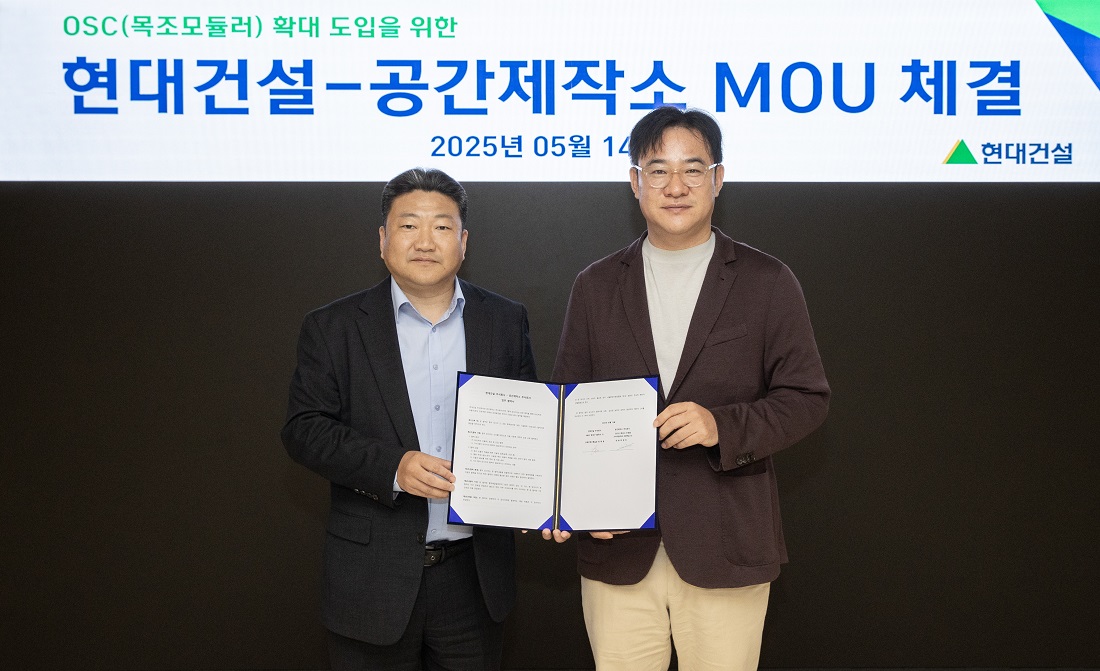Press Release
Hyundai E&C to Introduce Eco-Friendly Buildings Using Robotic AI Technology in Apartment Complexes
▲ Signed an MoU for the ‘Expanded Introduction of Wood-Based Modular Off-Site Construction (OSC) Technology’ to lead eco-friendly smart construction initiatives
▲ Accelerates the creation of an advanced residential culture that offers both sustainability and quality of life based on innovative technological solutions

Hyundai E&C is expanding the use of robotic automation in its construction processes through smart modular methods and is accelerating the creation of eco-friendly residential complexes.
On Wednesday, November 14th, at its headquarters in Jongno-gu, Seoul, Hyundai E&C announced that it had signed a Memorandum of Understanding with Space Factory for the ‘Expanded Introduction of Wood-Based Modular Off-Site Construction (OSC) Technology.’ The signing ceremony was attended by key officials from both companies, including Choi Jae-won, Head of the Residential Construction Execution Office at Hyundai E&C, and Park Jeong-jin, CEO of Space Factory.
Space Factory is a specialist in eco-friendly wood-based modular housing that leverages robotic AI technology. The company owns the largest smart factory of its kind in Korea with a fully automated production system and provides end-to-end solutions, from design and production to construction, based on its Building Information Modeling (BIM)-based design technology and high-precision production system.
With this agreement serving as a foundation, Hyundai E&C plans to bolster both the efficiency and quality consistency of construction initiatives by integrating Space Factory's high-precision automation technology into the ancillary facilities of its apartment complexes, and to fully expand its capabilities in eco-friendly and smart construction.
The automation-centered factory production method is effective in reducing carbon emissions by minimizing on-site work, which not only shortens construction periods and improves site safety but also utilizes wood as the primary structural material. In addition, it is regarded as a sustainable construction method that offers both eco-friendliness and process efficiency by eliminating factors that lead to material and energy waste.
Wood-based modular OSC technology is also gaining attention as a leading smart construction technology, as it lowers construction risks across the board while increasing quality and productivity, and also provides a residential environment tailored to the customer's needs.
Hyundai E&C is planning to first introduce this technology at the Hillstate Yongin Mark Valley site, starting with smaller ancillary facilities that are easy to standardize in design, such as a kids' play area and a bicycle storage facility. The company plans to then gradually expand its application to standalone ancillary buildings, such as childcare centers and senior centers.
A Hyundai E&C official commented, “We are actively adopting solutions that can achieve both construction efficiency and environmental value through the application of smart construction technology based on eco-friendly materials.” The official added, “Through collaboration based on modular technology, we will drive innovation in the construction industry and strive to create residential spaces that take into account both the environment and quality of life.”
-
- Family-friendly certified company
-
- Dow Jones Sustainability Indices(DJSI)
- Construction·Engineering leader for 9 consecutive years
DJSI World for 15 consecutive years(2010-2025)
-
- Korea Institute of Corporate Governance and Sustainability(KCGS)
- Total rating A for 7 consecutive years(2018~2024)
Governance(B+), Social(A), Environmental(A)(2024)
-
- UN Global Compact(UNGC)
-
- Science Based Targets Initiative(SBTi)
-
- Carbon Disclosure Project
(CDP, Carbon Disclosure Project) - Hall of Fame for 7 consecutive years(2018~2024)
- 4 consecutive years (2021~2024) Platinum Club (highest ranking)
- Carbon Disclosure Project
-
- Red Dot · iF Award · IDEA Award
- Winning the ‘Grand Slam’ of the World's Top Three Design Awards
-
- Task Force on Climate-Related Financial Disclosures(TCFD)


